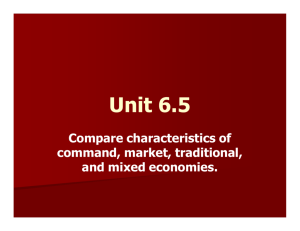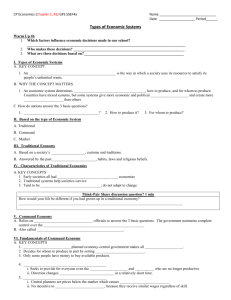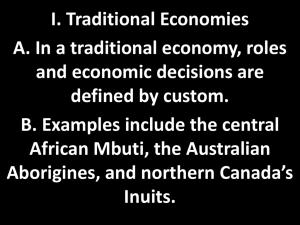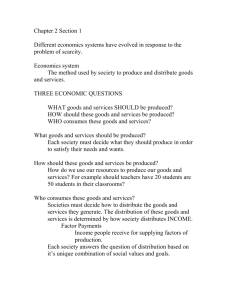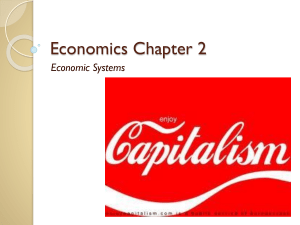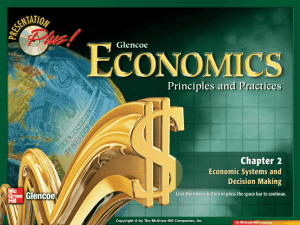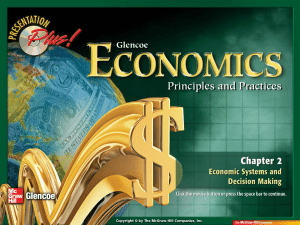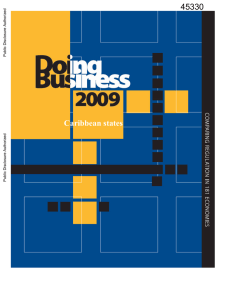Unit 2_ Economic Systems
advertisement
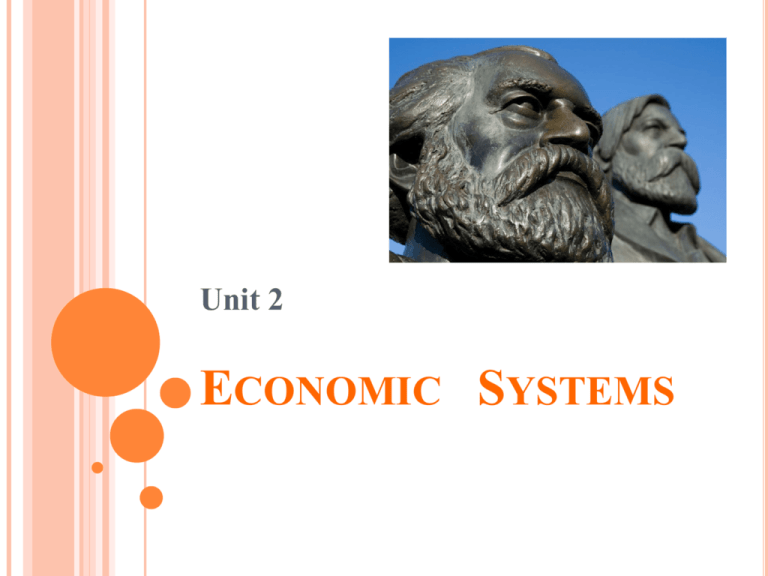
Unit 2 ECONOMIC SYSTEMS Warm Up 1. What does equality mean to you? 2. How do you define equality? 3. Should we be equal in every aspect of our lives? TYPES OF ECONOMIC SYSTEMS Traditional Economies – the allocation of scarce resources, and nearly all other economic activity, stems from ritual, habit or custom. Command Economies – are economies in which a central authority makes most of WHAT, HOW, and FOR WHOM decisions. Economic decisions are made by the government. Market Economies – People and firms act in their own best interests to answer the WHAT, HOW, and FOR WHOM questions. MIXED ECONOMIES OR MODIFIED FREE ENTERPRISE ECONOMY Most economies in the world today feature mix of traditional, command, and market economies. The United States has a combination of command (planned) and market economies. We have a market (free enterprise) economy with some government intervention. some PLACE THE U.S. ECONOMY? OF MIXED ECONOMIES Planned Free North Korea Makes most, if not all Economic Decisions The Role of Government Owns most key resources United States Canada Great Britain Germany China France India Russia Socialism Hong Kong SPECTRUM Promotes competition and Supplies' Public Goods SECTION 2 EVALUATING ECONOMI PERFORMANCE 1) Economic Freedom C – freedom to make your own economic decisions 2) Economic Efficiency – benefits gained must be greater costs incurred 3) Economic Equity – a strong sense of justice, impartiality, and fairness R than EVALUATING ECONOMIC PERFORMANCE CONTINUED 4) Economic Security – 5) Full Employment – protection adverse economic events as layoffs and illnesses from to produce as many jobs as possible 6) Price Stability – steady prices, void inflation 7) Economic Growth – of population growth R to meet the needs of SECTION 3 FREE ENTERPRISE In CAPITALISM a Capitalistic Economic System individuals own most of the factors of production. This economic system exists due to free enterprise. In a free enterprise economy, competition is allowed to flourish with a minimum of governmental interference. R MAJOR FEATURES 1. 2. 3. 4. 5. OF CAPITALISM Economic Freedom Voluntary Exchange Private Property Rights Profit Motive Competition COMPETITION & FREE ENTERPRISE Economic Freedom allows individuals and businesses to choose their economic destiny. A Voluntary Exchange happens when both parties benefit from the transaction. R COMPETITION & FREE ENTERPRISE CONTINUED The privilege that entitles people to own and control their possessions as they wish is known as Private Property Rights. COMPETITION & FREE ENTERPRISE Profit is the extent to which persons or organizations are better off at the end of a period than they were at the beginnin g. Profit motive is the driving force that encourages people and organizations to improve their material well being. CONTINUED COMPETITION & FREE ENTERPRISE CONTINUED The result of Competition is that goods and services are produced at the lowest possible cost and allocated to those who are willing and able to pay for them. R THE ROLE OF THE ENTREPRENEUR The entrepreneur is one of the most important people in a free enterprise (capitalistic) economy. The entrepreneur organizes and manages land, labor, and capital in order to seek the reward called profit. In other words – Entrepreneurs make things happen. THE ROLE OF THE CONSUMER Consumers play an important role in the American Free Enterprise economy. They control what is produced when they express their wants through purchasing goods and services. R THE ROLE OF GOVERNMENT (CONTINUED) Consumer – Federal, State and Local governments provide goods and services for citizens. In the process of providing, government consumes factors of production. Provider & THE ROLE OF GOVERNMENT Protector – The government protects property rights and enforces contracts to ensure an efficient and fair economy. THE ROLE OF GOVERNMENT (CONTINUED) Regulator – is The national government charged with preserving competition. Local and state governmentscontrol businesses with zoning regulations, taxes, insurance rates, etc. Promoter of National Goals The government should reflect the will of the majority of its people.
